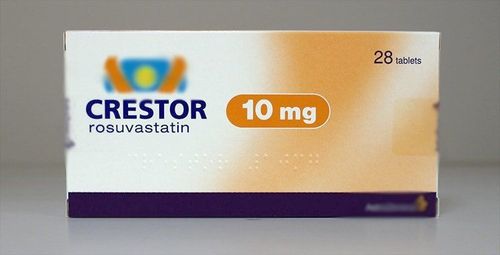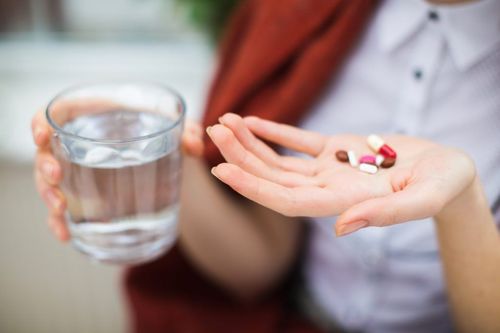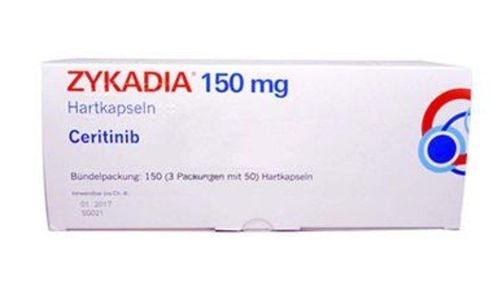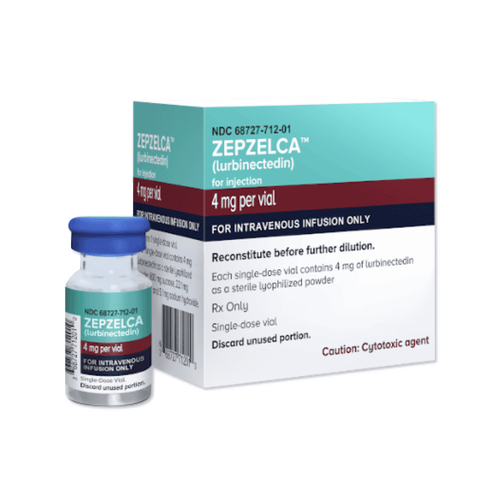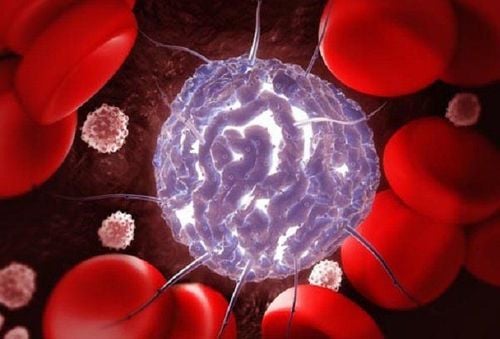This is an automatically translated article.
Venclexta degrades malignant lymphocytes through BCL-2 protein binding and inhibition mechanism. Venclexta is used in the treatment of chronic lymphocytic leukemia with a 17p deletion mutation. So what should patients pay attention to when using Venclexta?
1. What are the effects of Venclexta?
Venclexta medicine has the ingredient Venetoclax. This product binds to and inhibits BCL-2, a protein found on malignant lymphocytes. Therefore, Venclexta causes the destruction of lymphocytes in chronic lymphocytic leukemia (CLL). However, Venclexta is only approved for use in CLL patients with a 17p deletion mutation.
2. How to use Venclexta (Venetoclax)
Venetoclax manufactures and prepares tablets for oral use. Patients need to take Venclexta at the same time every day, after meals with a sufficient amount of water. Note that the patient must swallow whole, do not chew, crush or break Venclexta tablets.
The therapeutic dose of Venclexta is gradually increased over a period of time. During this time, staying hydrated is important to prevent tumor lysis syndrome, a condition caused by the rapid breakdown of malignant cells:
Patients should drink 6 to 6 days. 8 glasses of alcohol-free water per day, starting 2 days before the first dose, the day of the first dose, and each time the dose of Venclexta is increased; At each time the dose is increased, the patient can have a blood test due to the rapid lysis of the tumor under the influence of Venetoclax; Patients can receive intravenous fluids and appropriate drugs to protect the kidneys. If a dose of Venclexta is missed within 8 hours of usual, take the missed dose and resume your normal schedule. If you have missed a dose by more than 8 hours, skip the missed dose and resume your normal dosing schedule the next day. In case of vomiting after taking Venclexta, the patient should not take the additional dose but take the next dose as usual.
Venclexta blood levels can be affected by drugs or foods, including grapefruit products, star fruit, Seville oranges, Ketoconazole, Voriconazole, Ciprofloxacin, Amiodarone, Diltiazem, Carvedilol and Verapamil... Patient Tell your doctor about all medications and supplements you are taking.
Store Venclexta in the manufacturer's packaging or vial, labeled outside and in a dry place at room temperature. Venclexta is not suitable for storage in a medicine box and like other medicines should be kept out of reach of children and pets.
3. Venclexta side effects
3.1. Tumor lysis syndrome As mentioned above, Venclexta can lead to tumor lysis syndrome when a patient has a large number of cancer cells before starting treatment. This condition occurs when cancer cells die too quickly and their waste overwhelms the body. Patients may be prescribed appropriate medications (such as Allopurinol) and intravenous fluids to prevent this effect.
If the patient experiences nausea, vomiting, diarrhea or confusion, contact the doctor immediately. Tumor lysis syndrome can affect kidney function, so your doctor will monitor your kidney function through blood tests.
3.2. Decreased white blood cell count The risk of infection with Venclexta is increased by a decreased white blood cell count. Patients should notify their healthcare provider if they have symptoms of an infection such as fever, cough, shortness of breath, sore throat, painful urination, or delayed wound healing.
3.3. Venclexta causes anemia due to a decrease in the number of red blood cells. Red blood cells in the blood transport oxygen to provide for the functioning of organs in the body. When the red blood cell count decreases while taking Venclexta, the patient may feel tired, weak, and even short of breath. Severe anemia due to low red blood cell count should be considered for a blood transfusion.
3.4. Reducing the number of platelets The blood clotting process of the body has many different components involved, one of which is platelets. Taking Venclexta can lower the number of these blood cells, which can lead to an increased risk of abnormal bleeding. Therefore, patients with bleeding symptoms should notify their doctor, including bruising, nosebleeds, bleeding gums or bloody urine. When the platelet count is too low to function properly, the patient may need a platelet transfusion.
3.5. Nausea, vomiting Similar to other cancer treatment drugs, Venclexta can cause side effects such as nausea and vomiting. Patients should talk to their doctor to find out a way or medicine to control this side effect of Venclexta. In addition, dietary changes can be helpful, specifically avoiding things that make vomiting worse such as overeating, greasy/fatty, spicy or acidic foods (such as: lemon, tomato, orange).
3.6. Diarrhea The oncologist can prescribe the patient appropriate medications to reduce diarrhea while taking Venclexta . In addition, patients should try low-fiber foods, limiting the use of fresh fruits, green vegetables, whole grain breads, cereals and nuts. Additionally, soluble fiber supplements can be effective because of their ability to absorb water and help relieve diarrhea. Foods high in soluble fiber include apple sauce, ripe bananas, canned fruit, orange slices, boiled potatoes, white rice, white flour products, oatmeal, and chips. At the same time, you should pay attention to provide enough water (about 8-10 glasses of water) every day, do not use alcoholic beverages or caffeine to prevent dehydration.
3.7. Fatigue Fatigue is very common during cancer treatment and especially fatigue will not subside with rest. During treatment and for some time after Venclexta is discontinued, patients may need to adjust their daily routines to manage fatigue, with plenty of time to rest and exert themselves as a priority. Save energy for more important activities. Exercise can help fight fatigue, as simple as a daily walk with a friend. Also, talk to your doctor for helpful tips on how to deal with this side effect.
3.8. Musculoskeletal pain and headaches Your doctor or nurse may recommend certain medications and other strategies for pain relief during cancer treatment with Venclexta .
3.9. Effects on efficacy of live vaccines Patients or anyone living in the same household should avoid receiving live vaccines (including live attenuated vaccines) while taking Venclexta. Those vaccines include Herpes Zoster (Zostavax), oral polio vaccine, measles, inhaled flu vaccine, Rotavirus, and yellow fever.
3.10. Peripheral edema Peripheral edema is swelling of the extremities due to fluid retention. This effect can occur in the hands, arms, legs, ankles, and feet. The location of the edema can cause a lot of discomfort to the patient. Therefore, notify your doctor if you develop any new or more severe swelling.
4. Risk of reproductive effects of Venclexta
Exposure of the fetus to Venclexta can lead to dangerous birth defects, so patients should not become pregnant or fathering while taking this product. Effective contraception is essential during treatment and for at least 30 days after treatment with Venclexta ends. Also, nursing mothers should discontinue use while taking Venclexta or for 1 week after the last dose.
Please dial HOTLINE for more information or register for an appointment HERE. Download MyVinmec app to make appointments faster and to manage your bookings easily.
Reference source: oncolink.org




